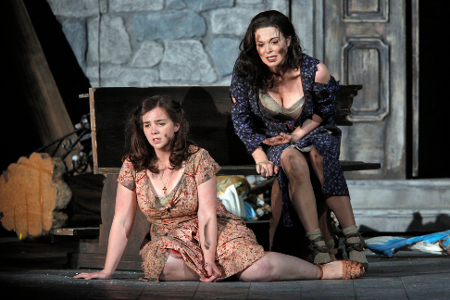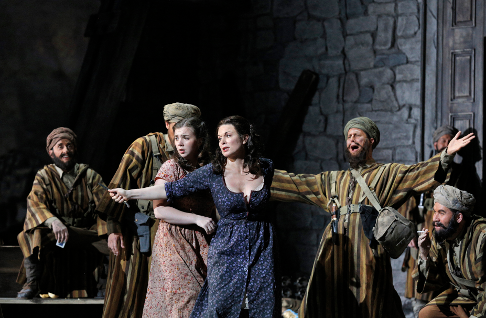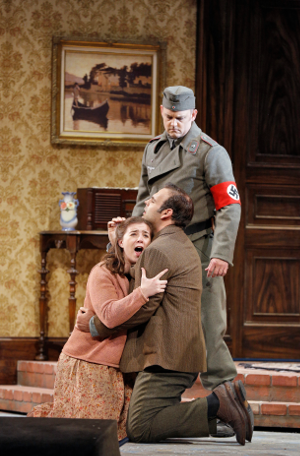
21 Jun 2015
Two Women in San Francisco
Why would an American opera company devote its resources to the premiere of an opera by an Italian composer? Furthermore a parochially Italian story?
English Touring Opera are delighted to announce a season of lyric monodramas to tour nationally from October to December. The season features music for solo singer and piano by Argento, Britten, Tippett and Shostakovich with a bold and inventive approach to making opera during social distancing.
This tenth of ten Live from London concerts was in fact a recorded live performance from California. It was no less enjoyable for that, and it was also uplifting to learn that this wasn’t in fact the ‘last’ LfL event that we will be able to enjoy, courtesy of VOCES8 and their fellow vocal ensembles (more below …).
Ever since Wigmore Hall announced their superb series of autumn concerts, all streamed live and available free of charge, I’d been looking forward to this song recital by Ian Bostridge and Imogen Cooper.
Although Stile Antico’s programme article for their Live from London recital introduced their selection from the many treasures of the English Renaissance in the context of the theological debates and upheavals of the Tudor and Elizabethan years, their performance was more evocative of private chamber music than of public liturgy.
Evidently, face masks don’t stifle appreciative “Bravo!”s. And, reducing audience numbers doesn’t lower the volume of such acclamations. For, the audience at Wigmore Hall gave soprano Elizabeth Llewellyn and pianist Simon Lepper a greatly deserved warm reception and hearty response following this lunchtime recital of late-Romantic song.
For this week’s Live from London vocal recital we moved from the home of VOCES8, St Anne and St Agnes in the City of London, to Kings Place, where The Sixteen - who have been associate artists at the venue for some time - presented a programme of music and words bound together by the theme of ‘reflection’.
'Such is your divine Disposation that both you excellently understand, and royally entertaine the Exercise of Musicke.’
‘And there was war in heaven: Michael and his angels fought against the dragon; and the dragon fought and his angels, And prevailed not; neither was their place found any more in heaven … that old serpent … Satan, which deceiveth the whole world: he was cast out into the earth, and his angels were cast out with him.’
There was never any doubt that the fifth of the twelve Met Stars Live in Concert broadcasts was going to be a palpably intense and vivid event, as well as a musically stunning and theatrically enervating experience.
‘Love’ was the theme for this Live from London performance by Apollo5. Given the complexity and diversity of that human emotion, and Apollo5’s reputation for versatility and diverse repertoire, ranging from Renaissance choral music to jazz, from contemporary classical works to popular song, it was no surprise that their programme spanned 500 years and several musical styles.
The Academy of St Martin in the Fields have titled their autumn series of eight concerts - which are taking place at 5pm and 7.30pm on two Saturdays each month at their home venue in Trafalgar Square, and being filmed for streaming the following Thursday - ‘re:connect’.
The London Symphony Orchestra opened their Autumn 2020 season with a homage to Oliver Knussen, who died at the age of 66 in July 2018. The programme traced a national musical lineage through the twentieth century, from Britten to Knussen, on to Mark-Anthony Turnage, and entwining the LSO and Rattle too.
With the Live from London digital vocal festival entering the second half of the series, the festival’s host, VOCES8, returned to their home at St Annes and St Agnes in the City of London to present a sequence of ‘Choral Dances’ - vocal music inspired by dance, embracing diverse genres from the Renaissance madrigal to swing jazz.
Just a few unison string wriggles from the opening of Mozart’s overture to Le nozze di Figaro are enough to make any opera-lover perch on the edge of their seat, in excited anticipation of the drama in music to come, so there could be no other curtain-raiser for this Gala Concert at the Royal Opera House, the latest instalment from ‘their House’ to ‘our houses’.
"Before the ending of the day, creator of all things, we pray that, with your accustomed mercy, you may watch over us."
The doors at The Metropolitan Opera will not open to live audiences until 2021 at the earliest, and the likelihood of normal operatic life resuming in cities around the world looks but a distant dream at present. But, while we may not be invited from our homes into the opera house for some time yet, with its free daily screenings of past productions and its pay-per-view Met Stars Live in Concert series, the Met continues to bring opera into our homes.
Music-making at this year’s Grange Festival Opera may have fallen silent in June and July, but the country house and extensive grounds of The Grange provided an ideal setting for a weekend of twelve specially conceived ‘promenade’ performances encompassing music and dance.
There’s a “slide of harmony” and “all the bones leave your body at that moment and you collapse to the floor, it’s so extraordinary.”
“Music for a while, shall all your cares beguile.”
The hum of bees rising from myriad scented blooms; gentle strains of birdsong; the cheerful chatter of picnickers beside a still lake; decorous thwacks of leather on willow; song and music floating through the warm evening air.

Why would an American opera company devote its resources to the premiere of an opera by an Italian composer? Furthermore a parochially Italian story?
Possible answers multiply. San Francisco Opera music director is the Italian conductor Nicola Luisotti who will have held sway. Perhaps San Francisco Opera concurs that it has not had success with its recent premieres by American composers so thinks a journey back to the wellspring of opera might be a good idea.
A further and more palatable idea is that Two Women is potentially a rare story that supports operatic treatment. It is, at least in the eponymous Vittorio De Sica film, a story that has not been artistically explored — the sharing of the sublimely delicate moment when a girl becomes a woman (well, let us forget about Salome for the moment). The De Sica film explores this passage, this dramatic moment, in subtle and startling psychological terms laden in existentialism. The film is a masterpiece. Indeed ripe for opera.
The sound world of composer Marco Tutino supports such atmospheres. Tutino is a colorist who offers surprise after surprise in his score for Two Women, timbres that are hardly new — the bass clarinet for example — but were strategically placed to evoke heretofore unfelt sensations. Without creating an explicitly individual style Tutino avoids any derivative definition, though one might say that his conservative twentieth century sound has its roots in the verismo of Giordano but remains open to incorporating later techniques when called upon, like his very effective use of minimalism.
The opera Two Women or its Italian title La ciociara surely rides the coattails of the De Sica film so to be able to gain Italian and international attention. Comparison is therefore unavoidable, appropriate and in fact enlightening.
The De Sica film is derived from a novel, La ciociara (1957) by Italian novelist Alberto Moravia (Ciociara is a region of bleak and rocky hills south of Rome). Two Women was the title given the English language translation of La ciociara. The libretto for the opera Two Women is derived from a script by one Luca Rossi, it in turn derived from the Moravia novel.
 The two women and their Moroccan rapists
The two women and their Moroccan rapists
Unlike the film which focuses on the complex psyches of the two women and absolutely nothing else the libretto delves into the Italian or rather human psyche that in wartime abdicates principle to collaborate with whoever or whatever is powerful at the moment. The libretto creates villains, from the Nazi commander to his local collaborators and to the Moroccan mercenary thugs who rape the two women. A powerful sense of evil is created that is pitted against the survival of the two women and their young male soulmate. That the daughter achieves womanhood in a singularly brutal fashion becomes the secondary, and less important story.
Though it is a thoroughly Italian event the only Italian in the cast was mezzo-soprano Anna Caterina Antonacci as the mother (who by-the-way gives Sophia Loren a run for her money as the costuming intends). Her daughter was sung by American ingenue soubrette Sarah Shafer. While vocally appropriate — a warm, lower voice for the mother and a higher, much brighter voice for the daughter — the two heroines were not physically matched, troublesome in the often cinematic circumstance of this production.
 Sarah Shafer as Rosetta and Dimitri Pittas as Michele with Nazi soldier
Sarah Shafer as Rosetta and Dimitri Pittas as Michele with Nazi soldier
The young, pacifist school-teacher who infatuates both mother and daughter was sung by American tenor Dimitri Pittas (enough of a look-alike for Jean-Paul Belmondo from row P). The two villains were San Francisco Opera’s Scarpia, Mark Delavan as Giovanni and SFO’s Hoffmann villain, Christian Van Horn as the Nazi commandant.
Marco Tutino also created the libretto for his opera. It was staged by an all-American team (or at least all English speakers). The staging was a combination of cinematic scenes, docudrama of the advancing American forces in the liberation of Rome, the storybook fantasy of a verdant hilltop village in the arid region south of Roma as a sort of paradise, cut-out sets à la American musical and, yes, even moments of old fashioned opera.
The action unfolded in a series of vignettes that incorporated this potpourri of styles culminating in a complex, indeed impressive number (it is a numbers opera) where the action flip flopped between the rape of the women and the murder of Michele (the Belmondo role). Effective also was the scene of the Italian pop-crooner allowing composer Tutino to indulge in musical collage before he imagined a fairytale ending for his opera — a vision of the dead Michele walking toward the dream hilltop village.
The opening night audience accepted the opera as an old fashioned melodrama booing the villains, cheering the damsel (forgetting for the moment that she perhaps was not saved after all), and of course warmly thanking Mme. Antonacci and Mr. Pittas for ably holding their own against their cinematic competition (Loren and Belmondo). Comments overheard as the crowd left the theater were less enthusiastic.
As usual Maestro Nicola Luisotti forced his superb orchestra front and center, and it surely sang out all magic possible in Marco Tutino’s score. Interestingly and uncharacteristically the maestro allowed the singers to be actors in this drama rather than his musical puppets.
Said and done, the real opera remains the De Sica film. It creates one hundred minutes of pure lyricism, never descending to the cliches of movies or theater, or in the case of the opera Two Women to the cliches of musical theater.
Michael Milenski
Cast and production information:
Cesira: Anna Caterina Antonacci; Rosetta: Sarah Shafer; Michele: Dimitri Pittas; Giovanni: Mark Delavan; John Buckley: Eddie Nelson; Pasquale Sciortino: Joel Sorensen; Fedor Von Bock: Christian Van Horn; Maria Sciortino: Buffy Baggott; Italian Singer: Pasquale Esposito; Country Woman: Zanda Svede; Old Woman: Sally Mouzon. Orchestra and Chorus of the San Francisco Opera. Conductor: Nicola Luisotti; Stage Director: Francesca Zambello; Set Designer: Peter Davison; Costume Designer: Jess Goldstein; Lighting Designer: Mark McCullough; Projection Designer: S. Katy Tucker. War Memorial Opera House, San Francisco, June 13, 2015.